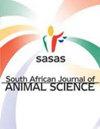Evaluation of Phyllanthus niruri L. powder on growth performance, haematology, and intestinal morphology of broilers
IF 0.6
4区 农林科学
Q3 AGRICULTURE, DAIRY & ANIMAL SCIENCE
引用次数: 0
Abstract
The objective of this study was to evaluate the dietary supplementation of Phyllanthus niruri L. powder (meniran powder, MeP) on the productivity, haematology profiles, and intestinal morphology of broilers. A total of 200 female, one-day-old chickens were allocated to five treatments randomly, with four replications (10 birds per replicate): control, without antibiotic and MeP; T2, Zn-bacitracin 0.05%; T3, MeP 0.02%; T4, MeP 0.03%; and T5, MeP 0.05%. A completely randomized design was employed. The results showed that MeP supplementation at 0.02%, 0.03%, and 0.05% did not affect the body weight, feed intake, feed conversion ratio, haemoglobin, packed cell volume; and lymphocyte, red blood cell, heterophil, monocyte, eosinophil, and basophil counts, but at 0.03% and 0.05%, appeared to reduce white blood cells (WBCs) compared to those in the control and Zn-bacitracin groups. Microscopically, MeP supplementation in the diet increased the height and cellular growth of the mucosal villi of the duodenum, jejunum, and ileum, but the villi appeared fragile as mucosal epithelial cell necrosis was noted in the taller villi. Thus, it is concluded that MeP did not affect broiler performance and haematology profiles, except that the number of WBCs at 0.03% and 0.05% was less than that in the control and Zn-bacitracin groups余甘子粉对肉鸡生长性能、血液学和肠道形态的影响
本研究旨在评价饲粮中添加余甘子粉(meniran powder, MeP)对肉鸡生产能力、血液学特征和肠道形态的影响。试验选用200只1日龄母鸡,随机分为5个处理,每4个重复(每个重复10只):对照组,不加抗生素和MeP;T2,细菌肽锌0.05%;T3, MeP 0.02%;T4, MeP 0.03%;T5, MeP 0.05%。采用完全随机设计。结果表明:添加0.02%、0.03%和0.05% MeP对体重、采食量、饲料系数、血红蛋白、堆积细胞体积均无影响;淋巴细胞、红细胞、嗜白细胞、单核细胞、嗜酸性粒细胞和嗜碱性粒细胞计数,但在0.03%和0.05%时,与对照组和杆菌肽锌组相比,白细胞(wbc)减少。镜下,饲粮中添加MeP可使十二指肠、空肠和回肠的黏膜绒毛高度和细胞生长增加,但较高的绒毛出现黏膜上皮细胞坏死,绒毛显得脆弱。由此可见,除0.03%和0.05% MeP组的wbc数量低于对照组和杆菌肽锌组外,MeP对肉鸡生产性能和血液学指标无显著影响
本文章由计算机程序翻译,如有差异,请以英文原文为准。
求助全文
约1分钟内获得全文
求助全文
来源期刊

South African Journal of Animal Science
农林科学-奶制品与动物科学
CiteScore
1.50
自引率
0.00%
发文量
39
审稿时长
>36 weeks
期刊介绍:
The South African Journal of Animal Science is an open access, peer-reviewed journal for
publication of original scientific articles and reviews in the field of animal science. The journal
publishes reports of research dealing with production of farmed animal species (cattle, sheep,
goats, pigs, horses, poultry and ostriches), as well as pertinent aspects of research on aquatic
and wildlife species. Disciplines covered nutrition, genetics, physiology, and production
systems. Systematic research on animal products, behaviour, and welfare are also invited.
Rigorous testing of well-specified hypotheses is expected.
 求助内容:
求助内容: 应助结果提醒方式:
应助结果提醒方式:


